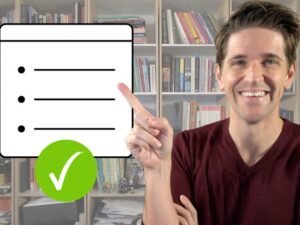- 030 244 2330
- info@preconceptacademy.com
English for Business: Professional Business English course
- Description
- Curriculum
- FAQ
- Reviews
Do you need to improve your English for your job or career?
If so, English for Business is the course for you! It will help you communicate better in everyday professional situations.
This intermediate-level Business English programme contains 20 lessons focusing on essential vocabulary and useful phrases and expressions for the workplace.
English for Business includes:
- Over 300 useful business phrases and expressions for the workplace
- 10 different accents in the listening activities (British, American, Canadian, Australian, Irish, Indian, Chinese and more)
- Listen and repeat (with phrases spoken by Native English speakers)
- Listening activities and realistic simulations
The course is divided into four sections:
Business English basics
- Introductions for business
- Making small Talk
- Making phone calls
- Attending job interviews
- Networking for business
Business English essentials
- Talking about your company and job
- Expressing your opinions
- Problems and suggestions
- Apologising, making excuses and promises
- Showing a visitor around
English for meetings
- The language of business meetings
- Diplomatic language
- Leading business meetings
- Business expressions and responses
- Talking about errors and queries
Business communication skills
- Describing charts and graphs
- Business presentation skills
- Negotiation skills
- Professional Email structure
- Email formality and style
English for business also includes:
- Regular quizzes to test your progress
- End of course final test
- Lessons on Business English idioms
- English for business also includes:
- Regular quizzes to test your progress
- End of course final test
- Lessons on Business English idioms
-
1IntroductionsVideo lesson
This lesson teaches expressions for first-time introductions. Through listening activities, students learn how to introduce themselves to new people, introduce a colleague or business associate and make appropriate small talk.
In the Listen and repeat section, learners can practise a total of 14 useful expressions to:
- Introduce yourself
- Greet somebody
- Introduce a colleague
- Make small talk
- Talk about your job
- Show interest in what other people are saying
-
2Small TalkVideo lesson
This lesson teaches expressions for making conversation in professional situations. Students will learn useful conversation openers, responses and phrases for making small talk with business associates.
In the Listen and repeat section, learners can practise a total of 12 useful expressions to:
- Ask questions to make small talk
- Change the topic of discussion
- Use background knowledge to make small talk
-
3Making Phone CallsVideo lesson
This lesson teaches useful expressions for starting and ending telephone calls. Through listening activities, students learn a variety of ways to answer the phone, introduce themselves to the receiver, ask to speak to someone and end a phone call.
In the Listen and repeat section, learners can practise a total of 13 useful expressions to:
- Answer a telephone call professionally
- Give your name over the phone
- Ask to be connected to someone
- Say the line is busy
- Say you will call back
- Offer to take a message
- End the telephone conversation
-
4Attending Job InterviewsVideo lesson
In this lesson, students learn useful vocabulary for attending a job interview in English. They will learn how to respond to a series of job interview questions and give professional responses.
In the Listen and repeat section, learners can practise a total of 18 useful expressions to:
- Talk about your strengths
- Talk about your professional experience
- Say where you work at the moment
- Tell a prospective employer why they should hire you
- Talk about your goals for the future
- Talk about your weaknesses
-
5NetworkingVideo lesson
In this lesson, learners will study a variety of phrases that can be used if they attend a business event or a conference. Students will be able to start conversations with new people, show interest in the other person, talk about their company and end the discussion politely.
In the Listen and repeat section, learners can practise a total of 10 useful expressions to:
- Professionally start a conversation with someone new
- Ask questions about the other person
- Talk about your company
- End the conversation
-
6Business English BasicsQuiz
This multiple choice quiz covers the content from lessons 1-5:
- Introductions
- Small Talk
- Telephoning
- Attending a job interview
- Networking
-
7Talking About Your CompanyVideo lesson
In this video, students learn useful vocabulary to talk about their company and job, including expressions for describing a company’s history, location, size and turnover. Students listen to dialogues of three employees talking about their work, describing their job responsibilities and what they like/dislike about their work.
In the Listen and repeat section, learners can practise a total of 13 useful expressions to:
- Say who founded a company
- Talk about a company's year of establishment
- Say how many employees a company has
- Describe job responsibilities
- Talk about what you like and dislike at work
-
8Expressing OpinionsVideo lesson
This lesson teaches language for sharing opinions during business meetings and discussions. Students listen to a dialogue of a teleconference where employees discuss a proposal to expand their business.
In the Listen and repeat section, learners can practise 29 phrases for exchanging their own opinions and ideas:
- Asking for opinions
- Expressing agreement
- Expressing disagreement
- Staying neutral
-
9Problems and SuggestionsVideo lesson
This lesson teaches useful expressions for discussing problems and possible solutions. Through listening activities, students learn how to make, ask for and respond to suggestions in a variety of ways.
In the Listen and repeat section, learners can practise a total of 30 useful expressions to:
- Declare a problem
- Find out the details of a problem
- Diagnose a problem
- Ask for a suggestion
- Make a suggestion
- Accept a suggestion
- Reject a suggestion
-
10Apologises, Excuses, PromisesVideo lesson
This lesson teaches common expressions for making apologies, excuses and promises. Through listening to dialogues and learning key expressions, students learn how to apologise for something, accept or reject an apology, explain a problem or mistake and promise action.
In the Listen and repeat section, learners can practise a total of 21 useful expressions to:
-Apologise
- Make an excuse
- Promise to take action
-
11Showing Round VisitorsVideo lesson
In this lesson, students learn vocabulary for describing areas of an office, shop or factory and practise giving a tour of their workplace using a variety of useful expressions.
In the Listen and repeat section, learners can practise a total of 18 useful expressions to:
- Start a tour
- Direct a tour
- Point something out
- End a tour
- Ask questions to the tour leader
-
12Business English EssentialsQuiz
A multiple choice quiz covering lessons 6-10
-
13Business MeetingsVideo lesson
This lesson teaches useful expressions for students who need English for business meetings and discussions. Through listening activities, students learn phrases as well as respond to opinions using a variety of techniques for agreeing and disagreeing.
In the Listen and repeat section, learners can practise a total of 24 useful expressions to:
- Ask for an opinion
- Agree with someone
- Disagree with someone
- Interrupt someone
-
14Diplomatic LanguageVideo lesson
This lesson teaches learners how to avoid causing offence in professional situations by expressing themselves in a more tactful, diplomatic way. Students will learn how to use a range of ‘softening’ structures to take the 'heat' out of potentially offensive situations in business.
-
15Leading MeetingsVideo lesson
This lesson teaches useful expressions for students who need to lead meetings and discussions in English. Through listening activities, students learn useful expressions for managing a meeting, including welcoming and introducing participants, inviting opinions, widening the discussion, sticking to the agenda and summarising the discussion.
In the Listen and repeat section, learners can practise a total of 20 useful expressions to:
- Welcoming participants
- Opening a meeting
- Establishing the agenda
- Sticking to the agenda
- Managing time
- Inviting contributions from participants
- Organising voting
- Dealing with conflict
- Closing a meeting
- Summarising
-
16Business ExpressionsVideo lesson
This lesson teaches 16 common business expressions that English speakers use in a variety of professional situations.
-
17Queries and Describing ErrorsVideo lesson
In this lesson, students learn how to report errors and query figures in English. A variety of vocabulary for describing different numerical mistakes is explored before students listen to a series of dialogues in which speakers report and explain errors.
In the Listen and repeat section, learners can practise a total of 13 useful expressions to:
- Reporting an error
- Explaining an error
- Quoting a discrepancy
- Promising to take action
-
18The language of meetingsQuiz
-
19Describing Graphs and ChartsVideo lesson
In this lesson, students learn how to talk about statistics and describe trends using combinations of nouns, verbs, adverbs and adjectives.
In the Listen and repeat section, learners can practise a range of 46 words for describing:
- Upward trends
- Downward trends
- Staying the same
- The speed of change
-
20Business PresentationsVideo lesson
In this lesson, students learn how to structure a Business presentation, using the correct vocabulary.
In the Listen and repeat section, learners can practise a range of 24 phrases for:
- Introducing a topic
- Giving an overview
- Making points in a presentation
- Summarising
- Handing questions
-
21Negotiating DealsVideo lesson
In this lesson, students learn how to negotiate in English. The lesson includes a series of short negotiation dialogues and focuses on vocabulary and listening comprehension.
In the Listen and repeat section, learners can practise 22 expressions for:
- Discussing interests
- Bargaining
- "Playing for time"
- Accepting a proposal
- Rejecting a proposal
- Closing a deal
-
22Email StructureVideo lesson
This lesson teaches useful vocabulary for learners who need to write emails in English. The lesson introduces the five parts of an email so learners can apply a professional structure to their written communication.
The lesson presents 14 expressions used when:
- Greeting someone in an email
- Writing pleasantries
- Explaining the reason for writing
- Giving a call for action
- Signing off
-
23Email FormalityVideo lesson
This lesson presents the differences between formal, informal and semi-formal email styles, introducing the "Formality Formula" for written communication. The lesson also introduces a variety of words and expressions that learners can put in order of formality. Learners get to match 9 formal verbs with their informal equivalents before re-writing an informal email in a more professional style.
-
24Business English CommunicationQuiz
Quiz covering lessons 16-20
-
25Final TestQuiz









